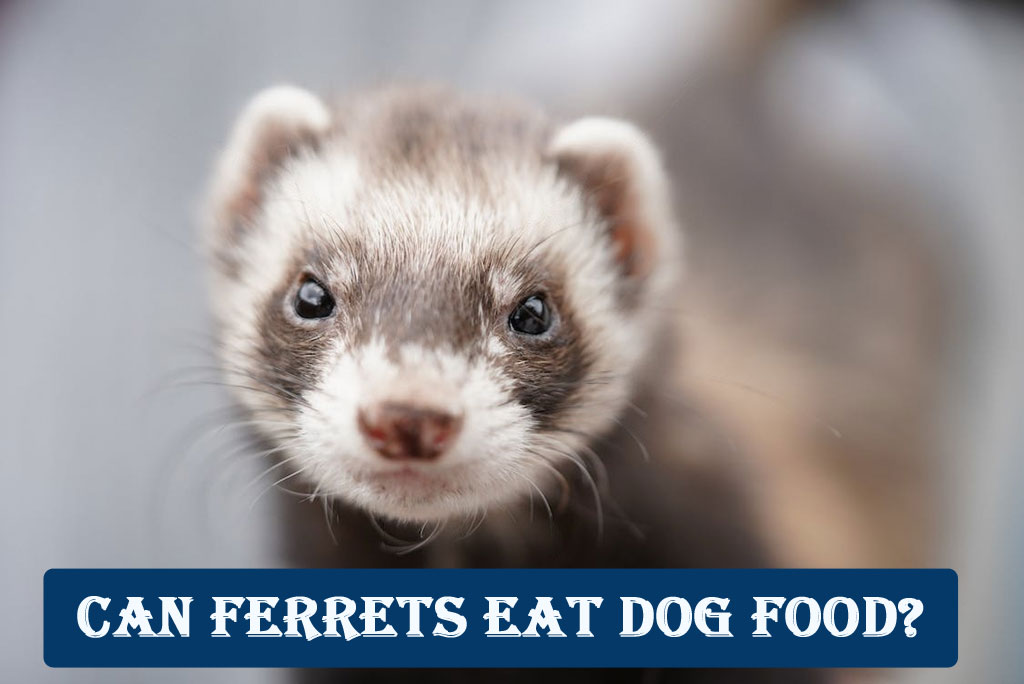
Can Ferrets Eat Dog Food?
Introduction
What is a ferret?
A ferret is a small, domesticated carnivore often kept as a pet. It belongs to the Mustelidae family, which also includes animals like weasels, minks, and otters. Ferrets have a long, slender body, short legs, and a bushy tail. They typically have a coat with a mix of colors, commonly including brown, white, and black.
Ferrets are known for their playful and curious nature. They are highly social animals and thrive on interaction with humans and other ferrets. Due to their inquisitive behavior, they enjoy exploring their surroundings and can be quite mischievous.
In the wild, ferrets are skilled hunters, primarily preying on smaller mammals and birds. However, domesticated ferrets are usually fed commercial ferret food or a diet suitable for their nutritional needs.
People have kept ferrets as pets for thousands of years, primarily for their companionship and hunting abilities. They require proper care, including a suitable diet, exercise, and a safe living environment. It’s important for ferret owners to be aware of their specific needs to ensure they lead happy and healthy lives.
What is dog food?
Dog food refers to specially formulated food designed to meet the nutritional needs of dogs. It is specifically crafted to provide dogs with the essential nutrients, vitamins, minerals, and other elements they need to maintain good health and well-being.
There are various types of dog food available, including:
- Dry Dog Food (Kibble): This is the most common type of commercial dog food. It consists of small, bite-sized pieces that are convenient to store and feed. Dry dog food generally has a longer shelf life compared to other types.
- Wet Dog Food (Canned): This type of dog food is packed in cans and contains a higher moisture content. It often has a more appealing texture and taste for dogs. Wet dog food can be a good option for dogs with dental issues or those that need to increase their water intake.
- Semi-Moist Dog Food: This type of dog food has a moisture content that falls between dry and wet food. It is typically stored in pouches and can be a convenient option for some dog owners.
- Raw Dog Food (BARF or Prey Model Diet): This is a diet that mimics a dog’s natural, ancestral diet, often including raw meat, bones, and vegetables. It’s important to note that this type of diet requires careful planning to ensure dogs get all the necessary nutrients.
- Specialized Dog Food: Some dogs have specific dietary needs due to health issues, allergies, or age. Specialized dog food is designed to address these specific requirements.
Commercial dog food undergoes extensive testing and is formulated to meet specific nutritional standards set by regulatory bodies. It’s important for dog owners to choose a dog food that is appropriate for their dog’s age, size, activity level, and any special dietary needs they may have.
Always consult with a veterinarian for guidance on choosing the right type and brand of dog food for your specific pet. They can provide recommendations based on your dog’s individual health and nutritional requirements.
Why might you ask if ferrets can eat dog food?
Asking whether ferrets can eat dog food is important because it pertains to the health and well-being of the ferret. Ferrets have specific dietary needs that differ from those of dogs. While both are carnivores, their nutritional requirements and digestive systems are not identical.
Here are a few reasons why it’s important to consider what a ferret eats:
- Nutritional Balance: Ferrets require a diet that is high in animal protein and fat, with very low levels of carbohydrates. Their digestive systems are designed to process meat-based diets efficiently. Dog food may not provide the appropriate balance of nutrients for a ferret.
- Taurine Requirement: Taurine is an amino acid that is essential for the health of many animals, including ferrets. Unlike dogs, ferrets cannot synthesize taurine on their own and need to get it from their diet. Many dog foods do not contain enough taurine for ferrets.
- Digestive Sensitivity: Ferrets have short digestive tracts and fast metabolic rates. They require easily digestible foods. Some dog foods may contain ingredients or additives that are not suitable for ferrets.
- Size of Kibble: The size and texture of dog food kibble may not be appropriate for a ferret’s mouth and teeth. Ferrets have small mouths and sharp teeth, and they may have difficulty eating larger pieces.
- Potential Allergies or Sensitivities: Some ferrets may be allergic or sensitive to certain ingredients commonly found in dog food, which could lead to digestive issues or other health problems.
- Avoiding Health Complications: Feeding an improper diet could lead to malnutrition, obesity, dental issues, or other health complications in ferrets.
For these reasons, it’s important to consult with a veterinarian or a knowledgeable exotic pet expert to determine the diet for a ferret. They can provide specific recommendations on commercial ferret food or advise on a balanced homemade diet that meets the individual needs of the ferret. Feeding the right food is crucial for ensuring the long-term health and well-being of these curious and playful pets.
What is ferret food?
Ferret food is a specially formulated type of pet food designed to meet the nutritional needs of ferrets. Ferrets are obligate carnivores, which means they primarily eat meat. Therefore, their food should be high in animal-based protein and fat, and low in carbohydrates.
Good quality ferret food typically contains ingredients like:
- Animal Protein: This is the primary ingredient and can come from sources like chicken, turkey, or other meats. It’s crucial for muscle development and overall health.
- Animal Fat: Ferrets require a higher fat content in their diet compared to some other pets. Fat provides them with a concentrated source of energy.
- Taurine: An essential amino acid for ferrets, which is found in animal tissues. It’s important for their heart health and overall well-being.
- Vitamins and Minerals: Ferret food is fortified with essential vitamins and minerals to support their growth and maintain their health.
- Digestible Carbohydrates: While ferrets don’t need a lot of carbohydrates, some complex carbs like vegetables can be included in their diet in small amounts.
It’s important to note that ferrets have a short digestive tract, so they need highly digestible food. Additionally, they can be prone to certain health issues, such as insulinoma (a pancreatic disorder) and urinary tract problems, so it’s crucial to feed them an appropriate diet.
It’s generally recommended to feed ferrets commercial ferret food that is specifically formulated for their dietary needs. Avoid feeding them dog or cat food, as these do not provide the right balance of nutrients for ferrets.
Always consult with a veterinarian who is knowledgeable about ferrets for specific dietary recommendations based on your pet’s age, health, and individual needs.
Nutritional requirements of ferrets
Ferrets have unique nutritional requirements due to their obligate carnivore status, which means they require a diet primarily consisting of animal-based protein and fat. Here are the key nutritional requirements for ferrets:
- Protein: Ferrets need a diet that is high in animal protein. This is essential for their muscle development, overall growth, and maintenance. A high-quality ferret food should have protein as the primary ingredient.
- Fat: Ferrets require a relatively high-fat diet compared to some other pets. Fat provides them with a concentrated source of energy. Look for foods with moderate to high fat content.
- Taurine: This is an essential amino acid for ferrets. It’s found in animal tissues and is crucial for their heart health and overall well-being.
- Vitamins and Minerals: Ferrets need a well-balanced diet with appropriate levels of essential vitamins and minerals. This includes vitamins like A, D, and E, as well as minerals like calcium and phosphorus.
- Digestible Carbohydrates: While ferrets are primarily carnivores, they can tolerate small amounts of complex carbohydrates like those found in vegetables. However, these should only make up a small portion of their diet.
- Fiber: Ferrets have a short digestive tract, so they don’t require much fiber. In fact, excessive fiber can be detrimental to their health.
- Water: Like all pets, ferrets require access to clean, fresh water at all times.
- Avoid Sugars and Grains: Ferrets are not able to digest sugars and grains well. Therefore, their food should not contain excessive amounts of these ingredients.
- Moderate Treats: If you give your ferret treats, make sure they are specifically formulated for ferrets and should only be given in moderation.
- Avoid Toxic Foods: Some foods that are safe for other pets can be harmful or toxic to ferrets. For example, chocolate, onions, garlic, and caffeine should be avoided.
It’s crucial to feed your ferret a balanced diet and to use commercial ferret food that is specifically formulated to meet their nutritional needs. Always consult with a veterinarian who is knowledgeable about ferrets for specific dietary recommendations based on your pet’s age, health, and individual needs. They can provide tailored advice to ensure your ferret remains healthy and happy.
Common ingredients in ferret food
Common ingredients in commercial ferret food are specifically chosen to meet the unique nutritional requirements of ferrets, which are obligate carnivores. Here are some of the common ingredients you’ll find in ferret food:
- Animal Protein Sources: These are the primary ingredients in ferret food and include poultry (chicken, turkey), meat by-products, and sometimes fish. Animal protein is essential for muscle development and overall health.
- Animal Fat: Ferret food contains animal fats, which provide a concentrated source of energy. Fat is an important component of their diet.
- Taurine: An essential amino acid for ferrets, taurine is typically added to ferret food to support heart health and overall well-being.
- Vitamins and Minerals: Ferret food is fortified with essential vitamins and minerals, including vitamins A, D, and E, as well as calcium and phosphorus, to ensure balanced nutrition.
- Digestible Carbohydrates: While ferrets are primarily carnivorous, some ferret foods may contain small amounts of complex carbohydrates derived from ingredients like vegetables or grains. These are included in limited quantities.
- Fiber: Ferret food generally contains minimal fiber since ferrets have a short digestive tract and don’t require much fiber in their diet.
- Preservatives and Antioxidants: To ensure the food’s shelf life and freshness, some preservatives and antioxidants may be added. These are usually safe when used in moderation.
- Artificial Colors and Flavors: Some ferret foods may include artificial colors and flavors to make them more appealing to pets. These ingredients are generally safe but not essential.
- Protein and Fat Content: The protein and fat content in ferret food is typically higher than what you would find in cat or dog food, reflecting the ferret’s dietary needs.
It’s important to read the ingredient list on commercial ferret food to ensure it meets these criteria and contains high-quality ingredients. Avoid feeding your ferret dog or cat food, as they have different nutritional requirements, and these foods may not provide the necessary nutrients for ferrets.
Always consult with a veterinarian who is knowledgeable about ferrets for specific dietary recommendations based on your pet’s age, health, and individual needs. They can help you choose the right food for your ferret and ensure they receive proper nutrition.
Can ferrets eat dog food?
The Short answer is “NO”.
Feeding ferrets dog food is not recommended as a long-term or primary source of nutrition. While dog food may contain some ingredients that are suitable for ferrets, it does not provide the specific balance of nutrients that ferrets require.
Ferrets are obligate carnivores, meaning they have a strict dietary requirement for animal-based protein and fat. Their digestive system is specialized for processing meat. Dog food, on the other hand, is formulated to meet the nutritional needs of dogs, which are omnivores. It often contains a higher percentage of plant-based ingredients and may not have the right balance of nutrients for ferrets.
If a ferret were to consume dog food on occasion, it is unlikely to cause immediate harm, but relying on it as a regular diet can lead to nutritional deficiencies and health issues over time.
It’s highly recommended to feed your ferret a commercial ferret food that is specifically formulated to meet their unique dietary needs. These foods are designed to provide the right balance of protein, fat, vitamins, and minerals required for a ferret’s optimal health. Always consult with a veterinarian who is knowledgeable about ferrets for specific dietary recommendations based on your pet’s age, health, and individual needs.
The risks of feeding ferrets dog food
- High carbohydrate content
- Low protein content
- High fat content
You’ve provided accurate information regarding the risks associated with feeding ferrets dog food. Here’s an elaboration on each of these points:
- High Carbohydrate Content: Dog food is formulated to meet the nutritional needs of dogs, which are omnivores. As a result, it often contains a higher percentage of carbohydrates. Ferrets, however, are obligate carnivores with a limited ability to digest and utilize carbohydrates. Feeding them dog food with high carbohydrate content can lead to digestive issues, obesity, and other health problems.
- Low Protein Content: Ferrets have a high protein requirement in their diet due to their strict carnivorous nature. Dog food is typically not formulated to meet this high protein demand. If a ferret is fed dog food regularly, it may not receive enough essential animal-based protein, which can lead to muscle weakness, poor growth, and overall health decline.
- High Fat Content: While ferrets do require a diet with a relatively high fat content, dog food may not provide the appropriate balance of fats that ferrets need. It’s crucial to ensure that the fat content in their diet comes from animal sources to meet their specific dietary requirements.
In summary, while small amounts of dog food on rare occasions might not immediately harm a ferret, it should never be relied upon as their primary source of nutrition. Providing a balanced, high-quality commercial ferret food is essential for their health and well-being.
Always consult with a veterinarian who is knowledgeable about ferrets for specific dietary recommendations based on your pet’s age, health, and individual needs. They can guide you in selecting the right food for your ferret to ensure they receive proper nutrition.
What should I feed my ferret?
- Types of ferret food
- How much to feed your ferret
Feeding your ferret a balanced and appropriate diet is crucial for their health and well-being. Here’s a guide on what to feed your ferret, the types of ferret food available, and how much to feed them:
1. Types of Ferret Food:
a. Commercial Ferret Food: This is the most convenient and widely recommended option. Look for high-quality ferret food from reputable brands. Ensure that the primary ingredients are animal-based proteins like chicken, turkey, or other meats. Avoid foods with excessive fillers, artificial additives, or high carbohydrate content.
b. Raw Diet (Barf Diet): Some ferret owners choose to feed their pets a raw diet, which consists of raw meats, organs, and bones. If you choose this route, it’s essential to do thorough research and consult with a veterinarian for guidance.
2. How Much to Feed Your Ferret:
a. Follow Feeding Guidelines: The packaging of commercial ferret food usually provides feeding guidelines based on the ferret’s age, weight, and activity level. Follow these recommendations as a starting point.
b. Monitor Weight and Adjust: Regularly monitor your ferret’s weight and adjust their portion sizes accordingly. If your ferret is gaining or losing weight, you may need to adjust their food intake.
c. Frequent, Small Meals: Ferrets have high metabolic rates and prefer to eat multiple small meals throughout the day. You can offer food in the morning and evening, with the option of a small snack in between.
d. Fresh Water: Ensure your ferret always has access to clean, fresh water.
3. Treats and Supplements:
a. Treats: If you give your ferret treats, make sure they are specifically formulated for ferrets. Treats should only be given in moderation and should not make up a significant portion of their diet.
b. Supplements: Generally, if you’re feeding a high-quality commercial ferret food, additional supplements are not necessary. However, if you’re feeding a homemade or raw diet, consult with a veterinarian about potential supplements, especially for essential nutrients like taurine.
4. Avoid Toxic Foods:
Certain foods that are safe for humans can be harmful or toxic to ferrets. For example, avoid feeding them chocolate, onions, garlic, and caffeine.
5. Regular Veterinary Check-ups:
Schedule regular check-ups with a veterinarian who is knowledgeable about ferrets. They can provide specific dietary recommendations based on your ferret’s age, health, and individual needs.
Remember, every ferret is unique, and their dietary requirements may vary. Consulting with a knowledgeable veterinarian will help ensure that your ferret receives the possible nutrition for their optimal health and well-being.
Conclusion:
Feeding your ferret a balanced and appropriate diet is essential for their health and well-being. Here’s a summary of the main points:
- Types of Ferret Food:
- Commercial Ferret Food: Look for high-quality options with animal-based proteins and minimal fillers.
- Raw Diet: If considering a raw diet, do thorough research and consult with a vet for guidance.
- How Much to Feed Your Ferret:
- Follow feeding guidelines provided on commercial ferret food packaging.
- Monitor weight and adjust portions as needed.
- Offer multiple small meals throughout the day.
- Treats and Supplements:
- Use treats sparingly and ensure they’re formulated for ferrets.
- Supplements may be necessary for homemade or raw diets; consult a vet.
- Avoid Toxic Foods: Keep ferrets away from foods like chocolate, onions, garlic, and caffeine, which can be harmful.
- Regular Veterinary Check-ups: Consult with a vet knowledgeable about ferrets for specific dietary recommendations based on their age, health, and individual needs.
Call to Action:
For more valuable pet care tips and information, consider subscribing to our blog. Share this post on your social media to help other ferret owners provide the nutrition for their furry friends. Remember, a well-balanced diet is the foundation of a happy and healthy ferret! 🐾




